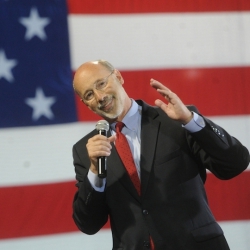
Gov. Tom Wolf says he will have to cut funding to school districts and services throughout the state.
Pennsylvania Governor Tom Wolf said he will initiate a spending freeze on certain state debts on September 15, due to an inability of the state’s politicians to agree on a $2.2 billion spending bill that includes gambling revenues.
While speaking to the Pennsylvania media, Gov. Wolf said he will be forced to suspend payments on a variety of programs which Pennsylvanians are going to miss: school funding, road repairs, emergency response systems, and volunteer fire protection. School districts and county governments across the state will have to make due without funding.
The spending freeze is set to begin days before a pivotal legislative hearing on video gambling terminals (VGTs). The two factions are split on the issue of VGT legislation, which is one of the key issues that has stood in the way of a negotiated settlement.
Senate Hearing on VGTs
The Senate Law & Justice Committee will hold hearings on the VGT legislation. State Sen. Chuck McIlhinney, the chairman of the Senate Law Committee, scheduled the hearing to answer basic questions about VGTs’ feasibility and efficacy.
According to Sen. McIlhinney’s office, other issues will be discussed at the hearing. One of those is liquor control enforcement at Stop-N-Go convenience stores across the state. In some versions of Pennsylvania’s 2017 budget bill, expanded alcohol sales were a part of the funding proposals.
Mustio v. McIlhinney
The debate in the VGT hearing is likely to follow along the lines set down by State Rep. Mark Mustio (R) and Sen. McIlhenney in the Pennsyvlania press last month. In an opinion piece for Delco Times, Rep. Mustio wrote, “Thousands of illegal VGTs are here in Pennsylvania, right now. They are being operated out of locations with no regulation, no oversight, and no money back to local and state governments.”
McIlhinney argues that Mustio presents a false choice. The Senate Law chairman replied in a public statement a few days later, “I guess we should thank the House for bringing this issue to light, though I find it disturbing that members of this legislature may have known about possible illegal gaming machines and done nothing about it.”
That is when Chairman McIlhinney announced a forthcoming hearing on the issue, which later was set for September 19. McIlhinney said, “We will be holding hearings on the issue of legal gaming machines and, as part of that process, will focus significant energy on addressing and ending this scourge of illegal VGT’s across the Commonwealth. I think it is important that we show the people of Pennsylvania we can address the problem of illegal VGTs before we talk about adding 55,000 new machines into venues across the state.”
House Bill: VGT Legislation
On one side of the budget debate is Speaker of the House Mike Turzai (R). The speaker wants to fund the $2.2 billion by borrowing $1.5 billion, then collecting revenues on expanded gambling. Roughly 40,000 video gambling terminals would be placed in taverns, restaurants, and other establishments throughout the state.
The state’s land-based gambling industry opposes VGTs, because they represent a rival gaming industry to the casinos’ and racinos’ slot machines. Pennsylvania’s largest brick-and-mortar casino, Bethlehem Sands Resort and Casino, spent $1 million to fund an anti-VGT political action committee, Pennsylvanians For Responsible Government. The PAC’s advertisement say the VGT bill would turn Pennsylvania into “The Land of 12,000 Casinos”, while placing gaming machines in “laundrymats and nursing homes”.
The Pennsylvania Licensed Beverage and Tavern Association supports the VGT bill. They argue that legalized video gambling terminals would help small business owners across the state. Lawmakers who support their cause argue that Pennsylvania already has underground VGT gaming which legalized VGTs would all-but-eliminate, since Pennsyvlanians would prefer to gamble in a legal establishment with more reliable rules. Those who argue for legal VGTs also point out the existing unregulated VGT industry already drains funds from the land-based casino industry, so the cannibalization they fear would not be as great as they suggest.
Senate Bill: Online Gambling Expansion
On the other side of the budget debate is Gov. Tom Wolf (D) and Senate Majority Leader Jake Corman (R). Both support the Senate Bill, which calls for about $200 million in gaming revenues, along with significant funding from a tax on the Marcus shale reservoir. House Republicans oppose the shale oil tax, saying it would harm the domestic natural oil industry.
The Senate Bill includes provisions for expanded online gambling, including online casinos and poker sites. Daily fantasy sports also would be legalized. The competing Senate and House bills have contained expanded online gambling throughout the summer, though experts differ on the odds online gambling is legalized in Pennsylvania in 2017. Given the impasse, some have begun to speculate that iGaming legislation will not pass until 2018.
Borrowing against Tobacco Settlement
The majority of the Senate Bill’s funding comes from borrowing against payments from the 1988 tobacco settlement. $1.3 billion would be taken from the tobacco settlement, which would be repaid through a bond issue.
Supporters of the Senate Bill criticize Mike Turzai’s plan, saying his borrowing another $1.5 billion might force the hand of credit rating agencies to downgrade Pennsylvania’s credit rating. If so, then bond issues would be less effective, interest rates would be higher, and creditors would be quicker to demand repayment.
